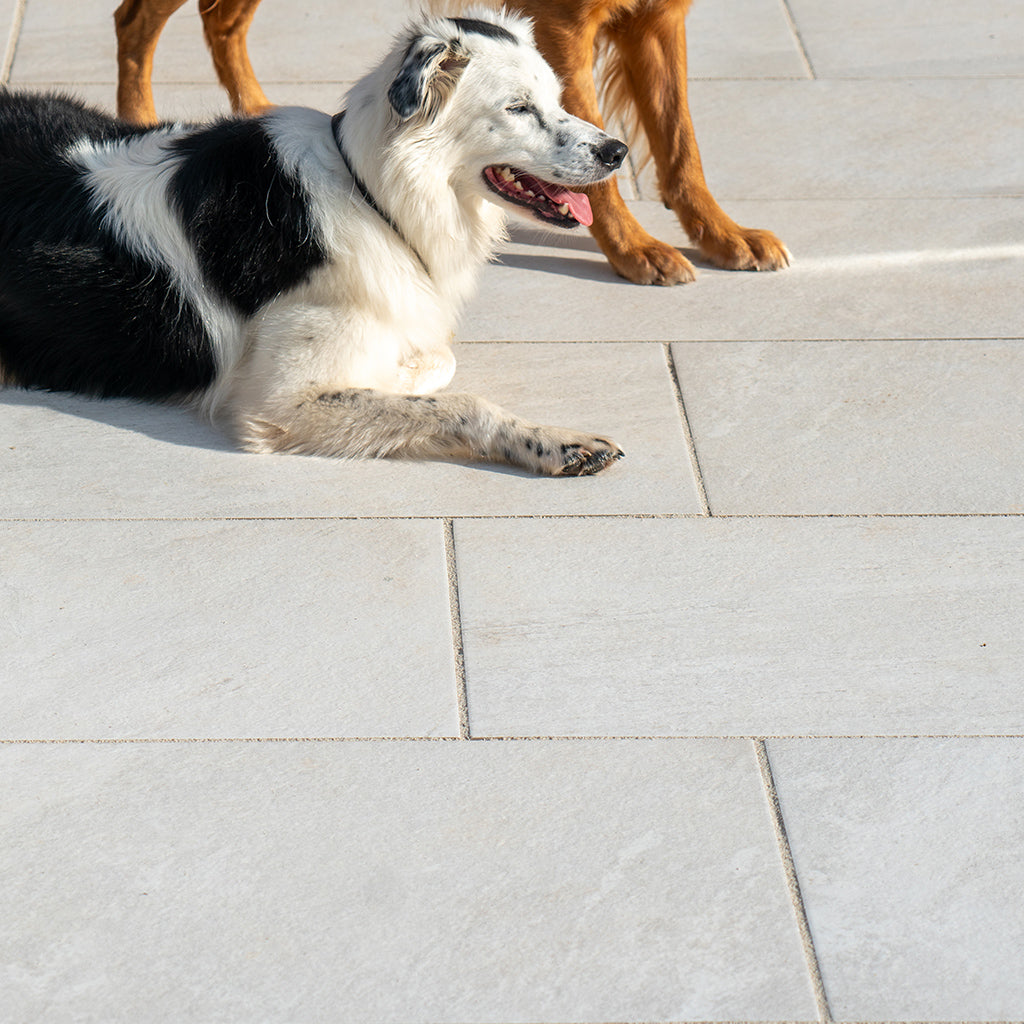0115 684 8754

The pros and cons of porcelain paving
Porcelain paving is proving to be really popular in landscape gardening right now. It is low-maintenance, easy-to-clean, with the ability to mimic natural stone texture, whilst being less porous.
In this blog, we’ll review the pros and cons of installing and maintaining porcelain paving, so you can determine if it’s the right product for your garden.

What is porcelain paving?
Porcelain paving is made from very fine sand and fieldspar, which are added to refined clay in a kiln. The slabs are baked at very high temperatures and under extreme pressure to eliminate cavities and voids. The result is a dense material with low water absorption which makes it a hard-wearing, long-lasting paving solution.
Porcelain paving pros and cons overview
If you’re struggling for time here is a quick glance of the advantages and disadvantages of porcelain paving:
|
|
Pros |
Cons |
|
Texture |
Is great at mimicking natural stone |
Although it mimics natural stone well visually, to touch it feels like porcelain |
|
Style |
Can be laid in a variety of patterns such as linear, staggered, brick-bond and random |
You get limited parent variations |
|
Resistance |
Resistant to scratches, stains, markings, UV rays. Moss, Mould, and Mildew - It doesn’t require sealers or protective coatings |
|
|
Durable |
It can withstand heavy-foot traffic |
You need to be careful when handling during the installation process |
|
Longevity |
It can last up to 50 years, and our paving comes with a 10 year warranty |
Needs to be installed correctly to benefit from the pros! |
|
Cleaning |
You can remove all traces of spills easily |
|
|
Cost |
Can be cheaper than some natural materials. It’s longevity will offset any initial costs that are more expensive |
|
|
Seasonal |
UV resistant, fire-proof and anti-slip |
You might become the go-to BBQ host of your friendship group! |
|
Installation |
Get a professional, don’t rely on DIY skills, you need specialist equipment and knowledge to ensure the longevity of your paving |

Advantages of porcelain paving slabs
For those who like a bit more detail of the overview, we’ve listed the advantages of porcelain paving slabs in this section:
It's durable
Porcelain is incredibly durable with an extremely low water absorption. This means it’s perfect for outdoor spaces as it can withstand high foot traffic, and with the proper installation, can handle the weight of vehicles.
Once installed, it is highly resistant to scratches, stains, markings and UV rays, which will increase the longevity of the product. If installed properly, Porcelain tiles can last up to 50 years. That is why we confidently offer a 10 year warranty (subject to fair wear and tear) across all our porcelain paving products.
It’s low maintenance
Our biggest belief at Select is that you should be spending more time enjoying your garden than maintaining it - we’re all for lazy garden maintenance - and Porcelain Paving falls wonderfully into that category.
Thanks to their dense composition, they have practically zero water absorption so don’t require sealers or protective coatings (although some people chose to seal Porcelain to make it even lower maintenance than it already is!).
It is also a lot less porous than natural sandstone, therefore debris like moss and mould, or spills like oil and grease are no problem. Porcelain stains are less likely to seep into the paving, making it easier for you you to remove spills.
To clean simply a mop and water, or jet wash - whichever you prefer!
No need for protective mats
Once installed, you don’t need to worry about furniture mats and pads under heavy objects to prevent scratching, porcelain is highly resistant, it’s really difficult to scratch.
It’s weather resistant and safe!
But are Porcelain tiles slippery? No! In fact, they are ‘slip resistant’ due to their low water absorption and textured surfaces. You don’t get a build up of slippery moss or mould, and it won’t fall victim to freezing and thawing. Our Paradiso porcelain paving comes with an R12 slip rating, which guarantees they won’t be slippery when wet.
Porcelain Paving is also resistant to UV Rays, with its colour and texture remaining vibrant and unchanged over time. And if you like having BBQ’s, you will be glad to hear that Porcelain is fire-proof. Overall, making it the safer option, throughout the year.
There is a rich catalogue of choice
You are spoilt for choice with Porcelain pavers, they come in a wide range of styles, textures and colours. In fact, they look indistinguishable from the natural stone or material they are mimicking, as each texture features rich colours and tiny mica flecks. Here is a quick guide on our Porcelain Paving and the elegant finishes they mimic:
|
Concrete Finish |
|
|
Natural sandstone |
|
|
Stone-effect |
|
|
Slate |




You can get creative with pattern variation
Porcelain paving slabs can be laid in all sorts of patterns to achieve different effects, such as brick bond, linear, staggered or as a random laying pattern. We recommend planning your pattern out before you start, to avoid mistakes.
If you’re leaning towards a random laying pattern design, try our Kandla project pack to help you create unique compositions.

Porcelain is cheaper than natural stone
Porcelain tends to be cheaper than natural stones. In addition its longevity and durability should also save you additional money in the long term.
We have two ranges of porcelain to choose from, our luxurious Italian porcelain paving, and our budget-friendly range, both strong, low-maintenance and beautiful.

Disadvantages of porcelain paving slabs
While there are a lot of pros, there are some problems with porcelain paving slabs, which you should keep in mind whilst making your decision:
They’re brittle
Due to the hard, dense nature of Porcelain paving, they tend to be quite brittle, much like the natural stone they are mimicking. This means that if your paving hasn’t been properly supported and laid it can crack under pressure.
Extra care needs to be taken when transporting and installing Porcelain pavers, as you don’t to risk chipping the material.
Risk of the slabs having a slight bow
Porcelain slabs over 750mm may have a slight bow to them, varying from none to a few mm. This is a natural result of the drying process.
If the slabs do have a slight bow, it means that when slabs are laid in a Brick bond pattern, you might notice a slight lip where the middle of one tile sits alongside the edge of another.
Note that lips in your paving can interfere with water run-off, which is important to consider when planning your paving. So check with a spirit level whether your slabs have a slight bow. If they do, this will limit your pattern choice, as we would recommend avoiding the Brick bond method completely.

Installing can be tricky
This is the biggest issue of all if you’re hoping to DIY your paving, as we advise leaving Porcelain paving to approved installers (installing porcelain yourself can be a paving pain!).
Porcelain slabs are thinner than concrete and natural stone, therefore they require a bed of adequate depth that is properly compacted, and its final layer of sand/ fine gravel needs to be levelled precisely. If you are hoping for vehicles to park on this paving, you will also need mortar over a reinforced concrete base.
Porcelain paving also requires specialist tools to drill or cut to shape. Diamond blades and a wet saw are required for cutting, and specific drill bits are required due to the density of Porcelain. And if the correct techniques are not followed when drilling, there is a risk of the Porcelain cracking.
If you’re looking for someone to cut, drill or lay your porcelain paving we’ve got a list of approved installers that will get the job done! We also have an installation guide, but we recommend a professional for this job - which really just means less stress for you!

How to lay porcelain paving slabs
For a hassle and stress-free installation we recommend that you use one of our approved installers to lay your Porcelain paving slabs - this is because you may need to use specialist tools and a compact, level bed is essential for longevity.
If you have access to these specialist tools, and have taken on projects like this before, we have a handy step by step guide for you to follow, as well as the essential tools needed to complete the job.

Conclusion
Choosing the right materials for your garden can be challenging but hopefully his guide has provided some insight on whether Porcelain is right for you. We find that it’s perfect for those who want to host BBQ’s or looking for a safe, anti-slip option that adds value to your home for many decades to come.
Porcelain paving that mimics natural stone, looks the part, but will save you money and comes with all the benefits Porcelain brings - no wonder Porcelain is a popular material amongst landscapers right now!
Have a look at our Porcelain Paving range for more inspiration.


